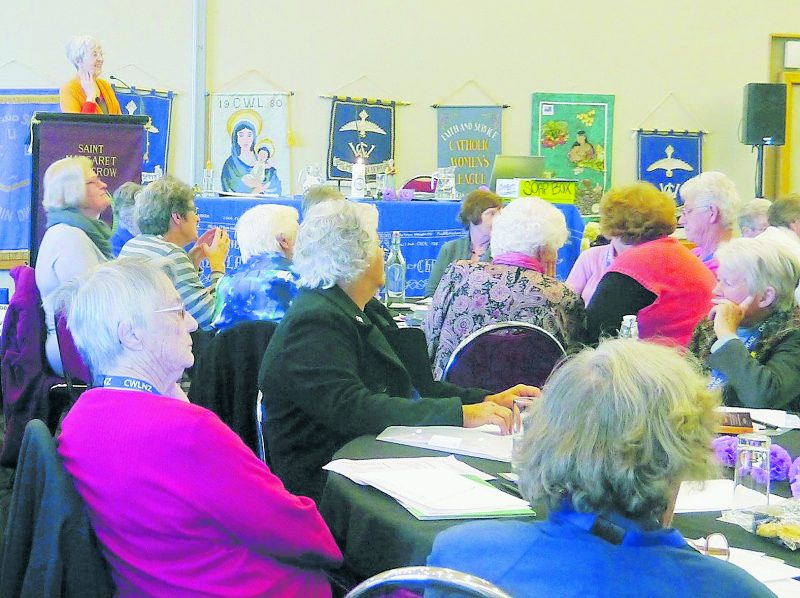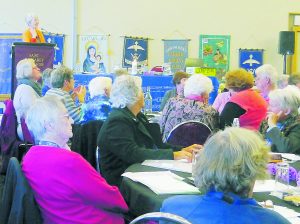by PETER GRACE
AUCKLAND — The biggest social mistake made by the elderly is the answer they give to the question, “How are you?”, says teacher, author and psychotherapist, Juliet Batten.
Ms Batten was a keynote speaker at the Catholic Women’s League national conference in Auckland last month. She gave a two part session, called “Five Pathways to Vital, Visible, Vibrant Spirited Living”, on CWL’s themes of “Vital, Visible, Vibrant”.
It is not true that you are losing capacity, Ms Batten told her audience.
“If you are dependent on having a well functioning body … you may find it hard as you age,” she said. “And you certainly won’t feel as if you are visible.”
However, it is not true that old age equates to loss of capacity.
“Of course, on the physical level there’s a diminution of capacity.” But in old age, we are much more than our bodies. We are emotion, wisdom; fetching, questing souls.
Many experts in the field of age talk about the psychology of choice, Ms Batten said. “One writer called it a choice between becoming fossilised and set in stone, or becoming transformed.”
If relationships becomes fossilised then they are of little use. “But if your relationships and faith are vital and open to renewal, then you too are likely to stay vital and vibrant. You will become radiant.”
Gene Cohen, author of The Mature Mind, studied more than 3000 minds and suggests mental capacity can increase significantly as we age, Ms Batten said.
In addition, there’s understanding now about a new kind of intelligence, that involves a maturing of capacity, a deepening of wisdom, and a sense of perspective and wisdom.
Other increases include expanded thinking, as the brain becomes more balanced as we age. There’s a new kind of creativity, and there’s social intelligence.
The limbic system also seems to grow calmer as we age. “It’s the part of the brain that reflects the fight or flight response, so we mellow as we age emotionally.”
All these positive changes are something that psychologists call gerotranscendence. “This is
a shift in meta-perspective, from the material to the more transcendent.”
The expansion of a person’s sensitivity includes an awareness of others, and life becomes more
surprising.
Being connected is also important.
“There’s a lot of research that demonstrates this is very good for our health as we age.”
Neuroscience today can tell us a good deal about what goes on inside the brain. And that
research finds that connection with community is a powerful health aid.
“The man who coined the phrase emotional intelligence has now gone on to write a book about
social intelligence, and this is the intelligence we show as a group.
“And the research of Daniel Goldman shows that love can make a chemical difference…He says that friendlessness has been found to be as detrimental to our health as smoking, or obesity.”
A California study, in Almeda County, found convincing evidence that marriage, membership of churches, clubs and other groups reduce the risk of death from the major killers, like heart
disease and stroke.
A New Zealand study of Maori people found that those who were connected to their marae and serving their marae had an especially high quality of life compared with the general population.
And there is a famous study of nuns in 1968. The researcher became part of the nuns’ community by visiting them regularly. Not only did they talk freely to him, but they left him their brains after they died.
“And he found a remarkable thing, that they should have had dementia and Alzheimers, they had all the symptoms, but they didn’t have Alzheimers. What he found for a fulfilling old age,
was the power of a community and a deeply shared spirituality.
“They had deep networks of sharing and love. The risk of death over the age of 65 was about 25 per cent lower for the Sisters of Notre Dame than for the average woman in the United States.”
The best way of service is through leadership and eldership, Ms Batten said.
“When we are in service, we don’t ask ‘What do they want?’, that’s a young person’s question. We ask, ‘What can I do to help’?”
There’s an old Yiddish proverb, she said: “Old age to the unlearned is winter. To the learned, it is harvest time.”
Ms Batten’s presentation ended with sessions using paper and coloured pencils. Delegates were asked to draw an upside down triangle, and write in it all that was diminishing in their lives.
Then they drew a right-side-up triangle, and in that wrote all the things that were increasing.
The exercise showed that the positive outweighed the negative.
So, Ms Batten said, if someone asks, “How are you”, answer from the positive first. For example: “Well, I am excited about something I am going to do. I have a beautiful rose blooming in my garden — and I am going to have a hip replacement!”


Reader Interactions